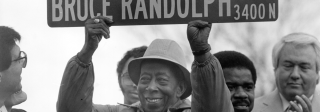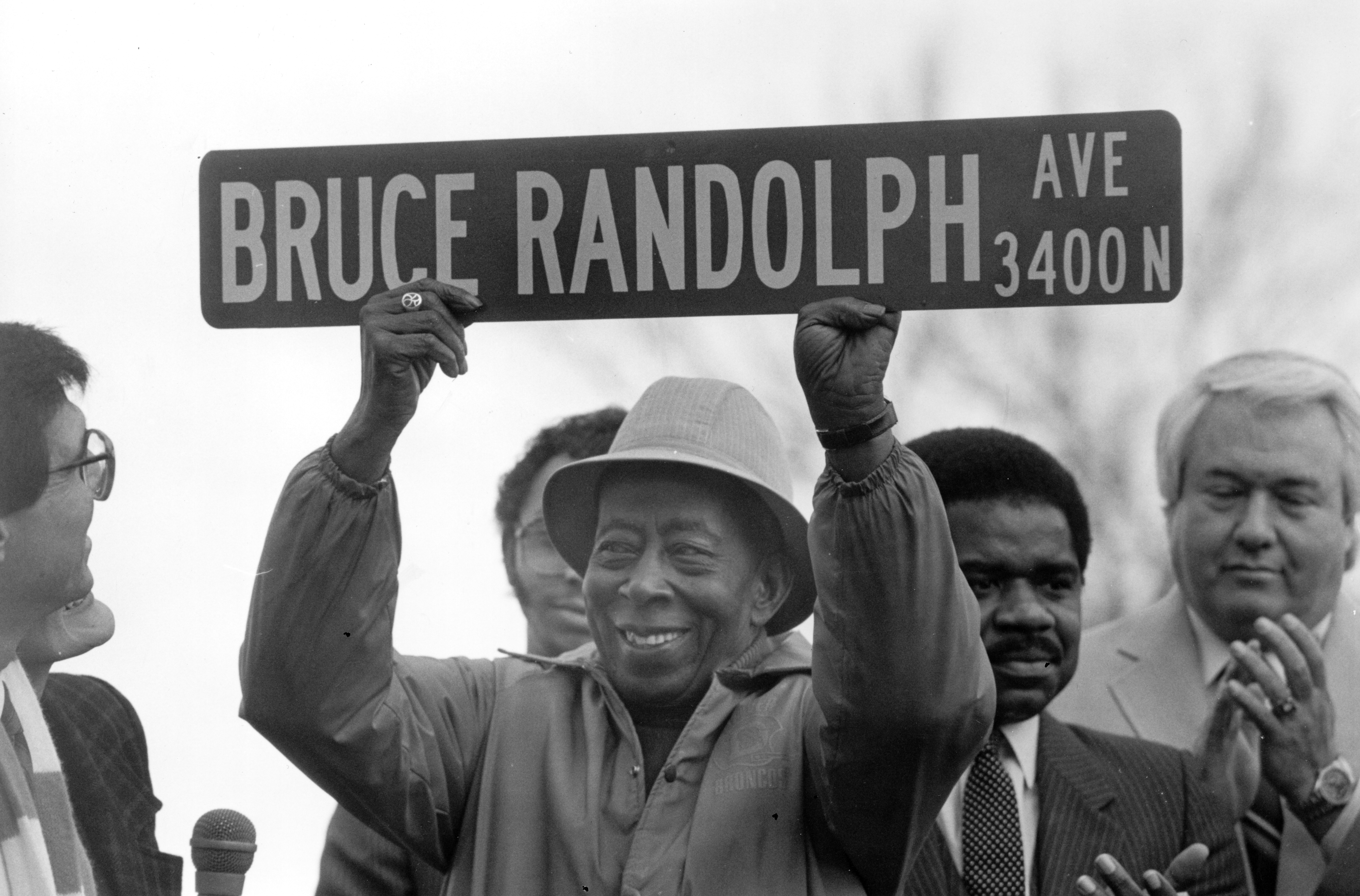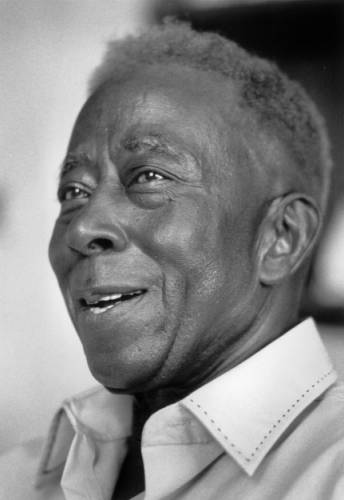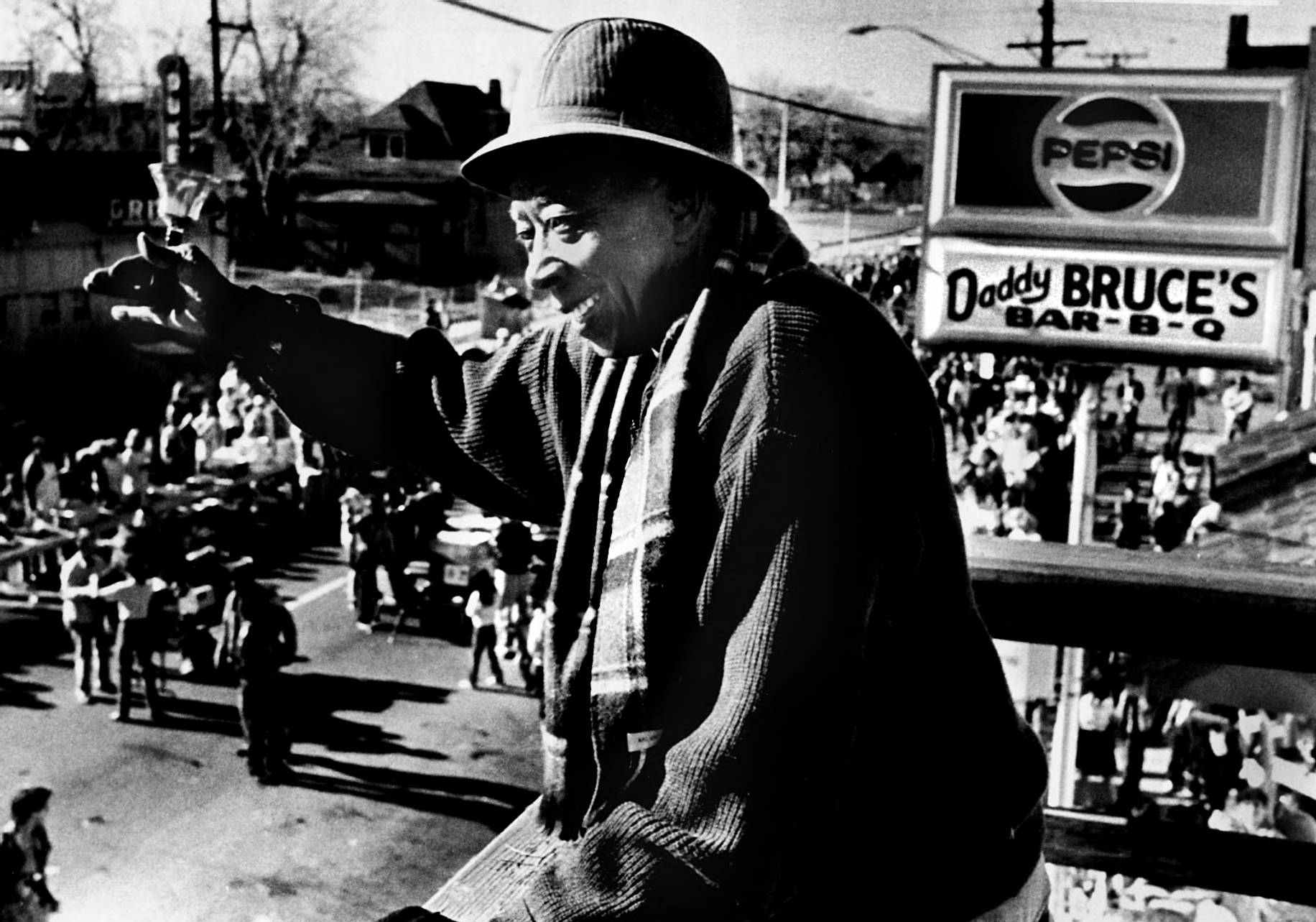
Story
A Mile-High Life in Barbecue: "Daddy" Bruce Randolph, Sr.
A Mile-High Life in Barbecue
Colorado's most prominent pitmaster in the twentieth century, "Daddy" Bruce was as famous for his generosity as he was for his sauce.
"A man up the river had 200 to 300 head of hogs settin’ on his place. I’d buy one, butcher it, barbecue it, cut a piece of meat off and put it twixt two slices of bread, then sell it for 10 cents a sandwich." That’s how Bruce Randolph, Sr., one of Colorado’s great barbecue men, described his first foray into barbecue entrepreneurship when he was eighteen years old. Randolph was born in Pastoria, Arkansas, on February 15, 1900, and grew up as part of a large family. Randolph quit school after the third grade, and spent the next decade doing a number of odd jobs. He picked cotton, worked in a mine, and eventually did some work for his uncle, Dr. M.M. McBeth. McBeth, whom Randolph called "Doc," was a strong influence, and Doc really believed in Randolph. He put him to work collecting bills for his medical practice. It turned out that he was very effective, probably because of his charm.
Randolph credited his formerly enslaved paternal grandmother, Laura Hart, for teaching him the barbecue craft. All of that time under Hart’s tutelage lit Randolph’s smoldering desire to make money from making barbecue. It took a while because Randolph’s years as a young man were pretty peripatetic. After flirting with dance hall businesses in Arkansas, running multiple restaurants, a hotel, and a taxicab business in Pampa, Texas, Randolph prospered, but he was financially drained after a bad divorce. "I just went and married the wrong woman," Randolph said in his soft Arkansas drawl to a newspaper reporter. "When her lawyers got through with me, I was just about busted again." He ventured to Tucson, Arizona, and started another barbecue business. Yet, the seasonal nature of running a business in a college town wasn’t profitable enough. He arrived in Denver in 1960, following his son, Bruce Randolph, Jr., who had moved to the Mile High City years earlier and ran a barber shop. It was his son who called him “Daddy Bruce” instead of just “Daddy,” and the nickname stuck. For the next few years, Randolph did a series of odd jobs to survive. But, barbecue kept calling his name.
Starting a barbecue business at that time in his life was a daunting proposition. Randolph certainly had the skill and the experience, but he was sixty-three years old and did not have the money to start another barbecue restaurant. Then something unusual happened. As noted in a biography of his life: "Randolph convinced an Englewood bank to loan him $1,000 on his signature. He used the money for a down-payment on a portable barbecue oven. Together with his son, Daddy Bruce towed the ‘barbecue pit on wheels’ to company picnics and parties all over Denver." He earned enough money to open a permanent restaurant, Daddy Bruce’s Bar-B-Q, at the corner of 34th Avenue and Gilpin Street in Five Points, Denver’s historically Black neighborhood. As word of his barbecue skills spread, people flocked to his restaurant. His menu featured barbecue standards like beef, chicken, hot link sausages, and pork spareribs. He also served soul food specialties like chitterlings (pork intestines), fried fish, and sweet potato pies for dessert. Just to prove that there was little Randolph couldn’t do, he smoked wild game by customer request.
Randolph’s reputation in the community grew to the point that he later became the official caterer of the Denver Broncos football team. That’s a position that he relished. He once told a Los Angeles Times reporter that "His passions are the Lord, people, and the Denver Broncos, in that order." When the Broncos went to the Super Bowl in 1978, Randolph flew down after them with a "bunch of ribs, four hams, and five big briskets." Broncos assistant public relations director Dave Frei had a hotel room and a bottle of champagne waiting for him, and then Daddy Bruce was escorted to the kitchen where employees were told "fix everything like I wanted it. My biggest job was keeping them cats in the kitchen from eating it all up."
Randolph owed more than his barbecue acumen to his paternal grandmother. Under her guidance, Randolph became a deeply spiritual man. Later in life, after success in the restaurant business, Randolph was inspired by the Biblical story of Jesus feeding five thousand people. He wanted to do the same. Instead of fish and bread, he served barbecue. For Randolph, any holiday was an opportunity to help someone. He hosted an Easter egg hunt, Fourth of July barbecues, and Thanksgiving dinner. Still, Randolph didn’t reserve his generosity solely for the holidays. As one Randolph biographer noted: "Even the ‘street people’ and the gamblers who haunt Five Points shine parlors and taverns know that Randolph will serve up a plate of ribs, beans and ‘slaw on credit with no questions asked."
His generosity was legendary, and free Thanksgiving dinners are the thing for which Randolph is most known. That tradition began in 1967 with Randolph giving away a truckload of food, and continued gaining momentum during the 1970s. As the word spread, more and more people showed up for Randolph’s Thanksgiving meal. Randolph took it up a notch in 1980 with his personal goal to feed 5,000 people "turkey, ribs, potatoes, beans, bread, and assorted other treats . . . ." After that, the number of meals served grew exponentially to 8,000 the next year, then 15,000 the year after that. Some claim that the number got as high as 50,000 during the 1980s. During several Februarys, he would travel back to Pine Bluff, Arkansas to feed thousands of people on his own birthday!
As for that sauce, Randolph has always credited his grandmother, whom he deeply loved, for his beloved recipe. Though I grew up in Denver, I never ate at Daddy Bruce’s, so I have no personal memories of the sauce. Most accounts described it as "pungent," and many have told me that it was very vinegary. When I asked about the sauce’s secret ingredient, Ron Mitchell, one of Randolph’s first cousins and a longtime manager at the restaurant said, "Just a lot of tender loving care. You could put all the ingredients in it, but without that, it wouldn’t taste the same." Bruce was a little more forthcoming when he was asked a decade earlier. In a 1984 newspaper article, an Arkansas Gazette reporter noted, "His Grandmother’s sauce recipe has served him well for six decades. Pungent with catsup, Worcestershire, Tabasco, vinegar, garlic, sugar and salt, it’s the sauce that makes the difference, he said, not the wood smoke.”
Randolph died in 1994 at ninety-four years of age. One measure of a man is the legacy that he leaves behind. With Daddy Bruce, one must speak of legacies in the plural. His son, Bruce Randolph, Jr. followed in his father’s footsteps, learning the barbecue craft and running a beloved barbecue restaurant in Boulder. Coincidentally, he also died at ninety-four years of age. Randolph helped others learn the barbecue business, even if they could be potential competitors. He mentored Football Hall of Fame nominee Winston Hill—a former offensive lineman for the New York Jets and Los Angeles Rams—who went on to run several successful barbecue restaurants in the Denver area.
The street where his restaurant once stood was officially named after him in 1985. He’s also the subject of numerous newspaper articles, a book (Daddy Bruce Randolph: The Pied Piper of Denver), and he even once got a shout-out in a rap song. In his 2011 State of the Union Address, President Barack Obama touted the academic achievement at a Denver Public School named after Randolph:
“Take a school like Bruce Randolph in Denver. Three years ago, it was rated one of the worst schools in Colorado; located on turf between two rival gangs. But last May, 97% of the seniors received their diploma. Most will be the first in their family to go to college. And after the first year of the school's transformation, the principal who made it possible wiped away tears when a student said, ‘Thank you, Mrs. Waters, for showing ... that we are smart, and we can make it.’"

Daddy Bruce and Mayor Peña among others at a ceremony renaming a street in honor of Bruce’s philanthropy in the mid 1980s.
In 2021, the school’s website boasted that one hundred percent of its senior class is college-bound. Undoubtedly, Randolph would be proud that so many young people have an opportunity to follow their dreams.
In 2002, inspired by Randolph’s example, Rev. Ronald Wooding created the Bruce Randolph Legacy Foundation to further Randolph’s community and humanitarian work. The foundation hosts an annual job fair, bestows a media excellence award, secured proclamations from key political figures in Colorado, and created a film documentary titled Keep a Light in Your Window. The foundation, in concert with Pastor King Harris of the Epworth Foundation, created the “Denver Feed-A-Family” program which coordinates a score of faith leaders, volunteers, and corporate sponsors to come together, in Randolph’s name, to continue the Thanksgiving community meal tradition. Randolph had a saying that adorned a billboard on his truck, and it was also right smack in the middle of his menu. As well as a motivating principle for his life, he thought it was the secret to his success. "Just say, God loves you and so does Daddy Bruce."
This essay is based on material that originally appeared in Adrian Miller’s James Beard Award-nominated book Black Smoke: African Americans and the United States of Barbecue, University of North Carolina Press (2021).
Sources:
Bruce Randolph School Lauded By Obama In State Of The Union | HuffPost Denver
Bruce Randolph School website: Bruce Randolph School (dpsk12.org)
"Daddy" Bruce Randolph (1900 - 1994) | Denver Public Library History (denverlibrary.org):
Fulk, Marion. "It’s His Birthday, but Daddy Bruce Does The Giving at a Barbecue for Thousands." Arkansas Gazette. February 13, 1984, 1B.
Grant, Billie Arlene. Daddy Bruce Randolph: The Pied Piper of Denver. Aurora, Colorado: Accent Advantage, 1986.
Kreck, Carol. "Daddy Loves His Barbecue." Denver Post, September 20, 1978: AA10.
Mullen, Frank. "Daddy Bruce, Denver’s rib royalty." Rocky Mountain Business Journal, September 13, 1982: 10-11.


